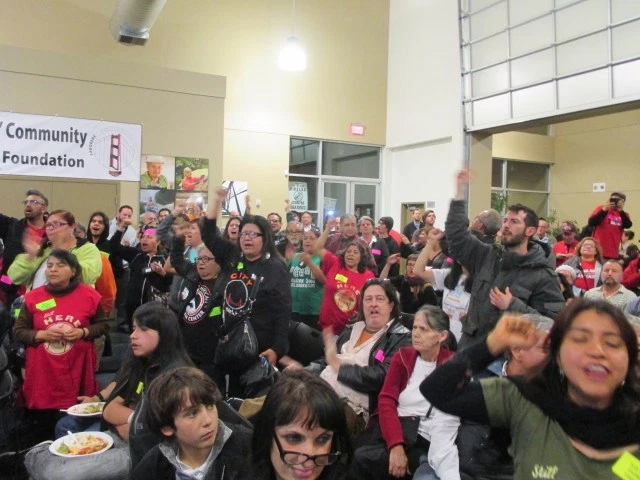No, it’s not — and the voters seem to agree

By Calvin Welch
NOVEMBER 24, 2015 — In a recent Chronicle Open Forum (November 20, “We Can Resolve Housing Crisis With Teamwork”) Gabriel Metcalf, Executive Director of SPUR, penned an oddly argued, personal, upbeat exhortation about how our affordable housing crisis is going to be solved if we just understand that “its going to be OK.” He says we can take his word for it: “I want to say to everyone already here, as compassionately as I can, is that its going to be OK.” He says that if we “take taller buildings,” “take more transit,” and “make room for more people” “it’s going to be OK.” That’s pretty much the sum total of his argument.
It seems clear that Metcalf’s reason for directing his remarks to “everyone already here” is that so many of us simply do not agree that under current development policy, strongly urged by Metcalf’s organization, SPUR, that “everything is going to be OK” for the obvious reason that everything, now and in the recent past, has not been “OK” and it’s clear for all to see which is why Metcalf’s musings are so odd. In the same edition of the Chronicle that his article ran — November 23 — three stories made this point.
A new market-rate development at Van Ness and Market will have only 20% of its units affordable to current San Francisco residents; the city is scrambling to find a short term $200 million “bridge loan” to continue the construction of the Transbay Terminal while having no idea how to finance the additional $2.5 billion to move CalTrain and other commuter transit service to the facility; and a front page report measures how the “Awful Commute is Getting Worse” in the Bay Area as the working class is priced out of Oakland, San Francisco and San Jose ( “all three are dynamic and growing” says the rather breathless Metcalf) and must commute, by car, from Tracy, Stockton and Ripon.
This November’s ballot in San Francisco showed how current residents disagree with Metcalf. Six of the 11 measures on the ballot dealt directly with trying to protect people already in San Francisco from the development pressures he and SPUR support. Each one of the measures got more total votes cast for them than the total votes cast for mayor.
Indeed, Mayor Lee, the chief proponent of the development policy favored by SPUR, got the fewest votes cast for any citywide candidate, and his hand-picked District 3 candidate, widely seen as favoring the same development policy as the mayor, was solidly rejected in favor of a candidate who campaigned directly on a program of protecting current residents and businesses from eviction and displacement. Clearly San Franciscans want equitable public policies not “faith based” exhortations to govern their future.
That we didn’t get all that we sought this November does not mean that we should quit trying and put our faith in the Metcalf “it’s going to be OK” line. We need to redouble our efforts at crafting creative, comprehensive and inclusive development policy.
The facts are indisputable:
- Between 1996 and 2015 area median income increased by 60% while housing costs increased by 398%;
- Over the last decade as we built more high rise, market rate housing actual housing costs increased (see the Controllers Residential Real Estate Summary) ;
- Where market rate residential development occurs next to transit car ownership increases and “higher income , car owning residents …are less likely to use transit” ;
- Existing neighborhoods experiencing most high density, market rate development are also experiences displacement of existing populations and local businesses that serve them (see UC Berkeley Urban Displacement map ) ;
San Franciscans correctly understand that the housing crisis we face is one of affordability, that housing affordability is dependent on household income and that household income, for San Franciscans, is often dependent on the ability of local businesses to continue to be located in San Francisco. The three go hand in hand and are, all three, dependent on a system of informed local land use policy that integrates the three (see Section 101 of the San Francisco Planning Code, drafted by the people and made law by the passage of Prop M in 1986 ).
That’s what the six ballot measures on this November’s ballot were mainly about: housing affordability and jobs for San Franciscans. What Metcalf calls for is the disaggregation of local land use policy (“we need to make some different planning decisions”), centered not on the needs of San Franciscans but for “waves of new arrivals” even as the “new arrivals” of yesterday are being displaced and evicted today!
“Things are going to change…that’s the nature of city life” he says. But the policies he supports simply keep the essential things the same: the wealthiest getting even wealthier, housing affordable only by the wealthy and streets, bridges and freeways clogged with cars. The only changes his polices have accomplished have diminished us all: fewer middle class people living and working in San Francisco, fewer San Franciscans riding Muni, fewer African Americans, artists and young families able to find employment or housing they can afford.
We need a comprehensive development policy that places housing in its true social context, that protects and enhances our neighborhoods, communities and businesses, that preserves space for the arts, the very young and the very old. To do that will produce real social change that will preserve and enhance a city not only for us but all in the world who, like us, yearn for such a place to live.
Calvin Welch teaches classes in the development history of San Francisco at USF and SFSU. He was a founder of the Coalition for San Francisco Neighborhoods and the Council of Community Housing Organizations.





